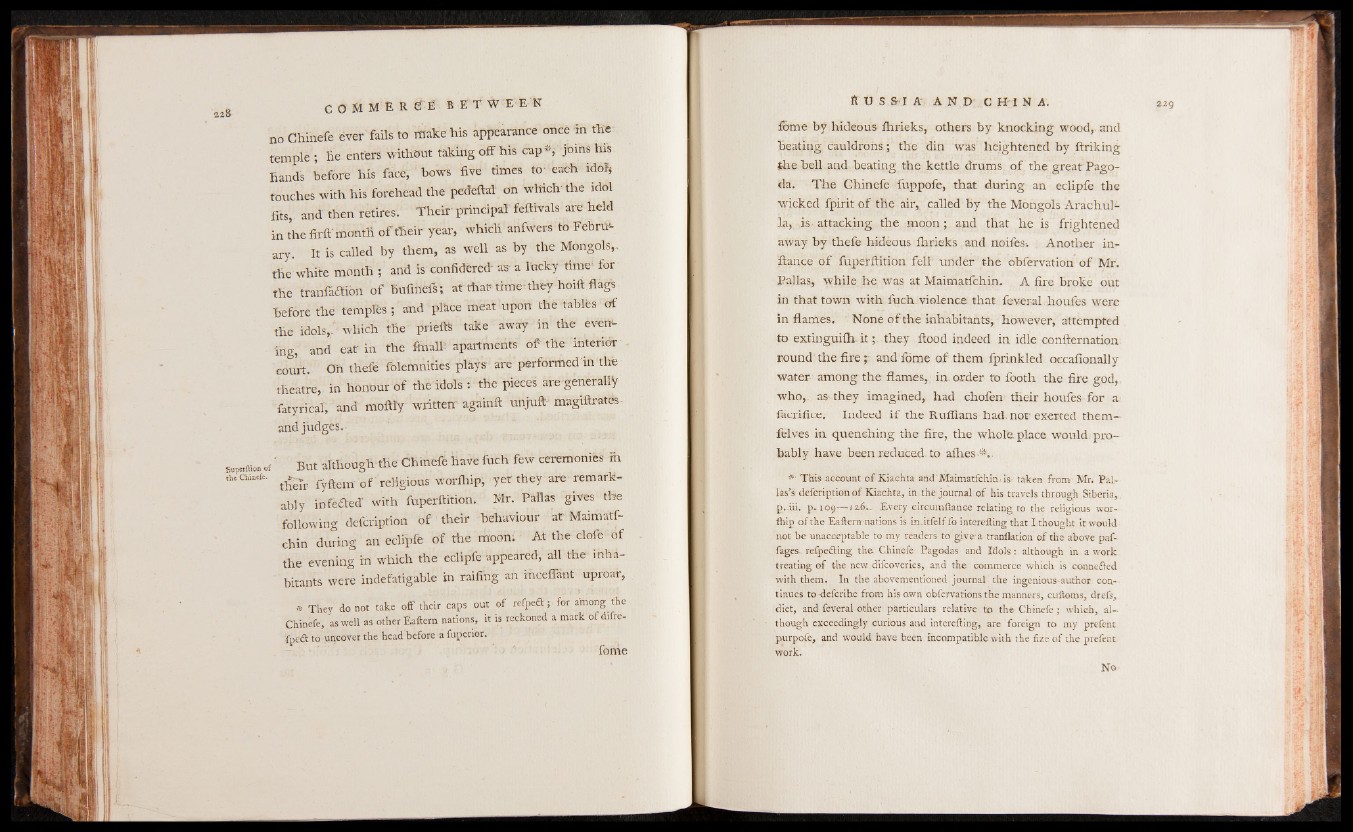
no Chinefe ever fails to make his appearance once in the
temple ; he enters without taking off his cap*,- joins his
hands before his face, hows five times to- each idol*
touches with his forehead the pedeftal on which- the idol
fits, and then retires. Their principal fefttvals are held
in the firftmonth o f their year, which anfvers to February.
it is called by them, as well as by the Mongols,,
the white month ; and is confidered as a lucky time for
the tranfdffion o f bufmelk; at that timeithey hoift flags
before the temples ; and plkce meat upon the tables erf
the idols," which the priefti; take away in the evening,
and eat in the finalP apartments o f the interior
court. On thefe folemnitieS plays are performed in the
theatre, in honour of the idols : the pieces are generally
fatyrical, and inoftly written againft unjuft magiftrates
and judges..
^ * ' But although the Chinefe have fuch few ceremonies m
thechmefe* ^ fyftem of religious worfhip, yet they are remarkably
infefted' with fuperftition., Mr. Pallas gives the
following defcriptioil of their behaviour at Maimatf-
chin during an eclipfe of the moon; At the clofe of
the evening in which the eclipfe appeared, all the inhabitants
were indefatigable in raiffng an mceflant uproar,
* They do not take off their caps out o f r e fp e d f o r among the
Chinefe, as well as other Eaftern nations, it is reckoned a mark of difre-
fpect to uncover the head before a fuperior.
fome
fome by hideous fhrieks, others by knocking wood, and
heating, cauldrons; the din was heightened by ftriking
fhe bell and. beating the kettle drums of the great Pagoda.
The Chinefe fuppofe, that during an eclipfe the
wicked fpirit of the air, called by the Mongols Arachul-
la, is attacking the moon; and that he is frightened
away by thefe hideous lhrieks and noifes-. f Another in-
ftance of fuperftition fell under the obfervation o f Mr.
Pallas, while he was at Maimatfchin. A fire broke out
in that town with fuch-violence that feveral houfes were
in flames. None of the inhabitants, however, attempted
to extinguilh.it;. they flood indeed in idle confternation
round the fire;: and fome of them fprinkled oecafionally
water among the flames,. in. order to footh the fire god,
who,, as'they imagined, had chofen- their houfes for a.
fticrifice. Indeed if the Ruffians had, not exerted them—
felves in quenching the fire, the whole place would, probably
have been reduced to allies *.
* This-account o f Kiaehta and Maimatfchin., is- taken, from Mr. Pallas’s
defoription o f Kiachta, in the journal o f his travels through Siberia,,
p.-iii. p. io y— 126.. Every cireumftance relating to the religious war—
fliip of .the Eaftern nations is inJtfelf fo interefting that I,th ought it would
not be unacceptable to my readers to give:a tranlktion o f the above paf-
fages refpedting the Chinefe Pagodas and Idols: although in a work
treating o f the new difeoveries, and the commerce which is connefied
with them. In the abovementioned . journal. the ingenious-author continues
to deferihe from his awn obfervations the manners, cuftoms, drefs,
diet, and feveral other particulars relative to the Chinefe; which, although
exceedingly curious and interefting, are foreign to my prefent
purpofe,- and would have been incompatible with the lize of the prefent
work.
No